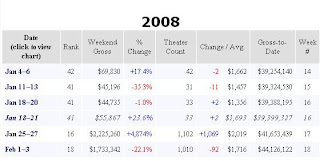 In what may be a less than surprising announcement, Warner Bros. declared today their desire to spawn several more Batman movies in the near future, as well as expand other franchises like Superman and Sherlock Holmes. Its not hard for the execs at Warner Bros. to do the math: The Dark Knight was the second-highest grossing movie of all time, second only to Titanic. If they can replicate even half that success, the studio would be rolling in dough, which is why they are most definitely keeping the possibility of a sequel open. But while the concept may be good for the bottom line, is it good for the franchise? The answer to me seems to be no.
In what may be a less than surprising announcement, Warner Bros. declared today their desire to spawn several more Batman movies in the near future, as well as expand other franchises like Superman and Sherlock Holmes. Its not hard for the execs at Warner Bros. to do the math: The Dark Knight was the second-highest grossing movie of all time, second only to Titanic. If they can replicate even half that success, the studio would be rolling in dough, which is why they are most definitely keeping the possibility of a sequel open. But while the concept may be good for the bottom line, is it good for the franchise? The answer to me seems to be no.First off, these movies that are such great success, like Dark Knight, are often because all the right players both behind and in front of the camera came together and almost magically clicked into place. Its rare to continue duplicating that success, as anyone can tell you who's watched a series play out its life. Look at the life of the Spider-Man films. The first one was pretty good, the second one was amazing...and then came number three. I had such high hopes for that film, that came crashing down around my ears. Overdone special effects, bad writing, and too many villains made for a colossal train wreck. Perhaps it was not as bad as it appeared to me, but because expectations for myself and the rest of the public were so high, we were greatly disappointed when the film failed to be merely adequate. And that was a sequel that had all the principle players still in line. The longer these film franchises go on, the more people will start drifting away. Actors often don't want to be type-cast, and sticking with one string of films is a surefire way to get locked into a stereotype. Will Christian Bale want to keep playing Batman? Will Michael Caine stick with Alfred, or will he perhaps retire from acting? As people leave, they'll need to be replaced, and the odds are that the chemistry will be lost. All it will take is for one failure of a sequel to drag the name of the original films into the mud.
Of course, series of films have been done in the past with some success. But when I say "the past," I am referring to the 1940s and '50s, when the studio system ruled and B-films were in fashion. Then it was easy to keep a tight control on talent and ensuring they went to the projects you wanted. It was also the heyday of the B-film, the acceptably low-budget picture that could be made quickly and easily. It was during this time period you got Hopalong Cassidy, Charlie Chan, Sherlock Holmes, and other series films that starred the same actor getting into a new scrape every few months. Nowadays, the B-film is dead, and everything has to be big budget or not at all. It also follows that a film has to make good money in order to cover the expenditures.
Will these franchises succeed in getting the go ahead? Spider-man has already gotten the green light for pictures 4, 5, and 6. Despite luke-warm reviews, the film made out big at the box office, and the same movie-goers will most likely turn out in droves for the fourth film because it has name recognition; it may be hypocritcal of me, but I most likely will see it as well, in the hopes that the third film was a fluke. But Hollywood doesn't seem capable of keeping a storyline fresh and creative for more than a few films. A franchise is either enormously successfull in its initial run and bombs in its second, or it starts strong in the first film, peaks in the second, and crashes in the third. As Christopher Nolan once asked a reporter, how many good third movies can you name? Very very few. In fact, there are barely any film franchises that have lived beyond three films beyond the horror genre, though that trend is starting to reverse; besides Spider-man, Pirates is making a run at a fourth movie as well.
I would love for Hollywood to be able to successfully create these movie franchises. It would give me great moving-going pleasure. But I am cynical enough to doubt that Hollywood is capable of turning out anything other than less-than-adequate sequels which will quickly become a joke. What do you think readers? Do I need to find faith again in Tinsel Town or am I justified in my skepticism?





